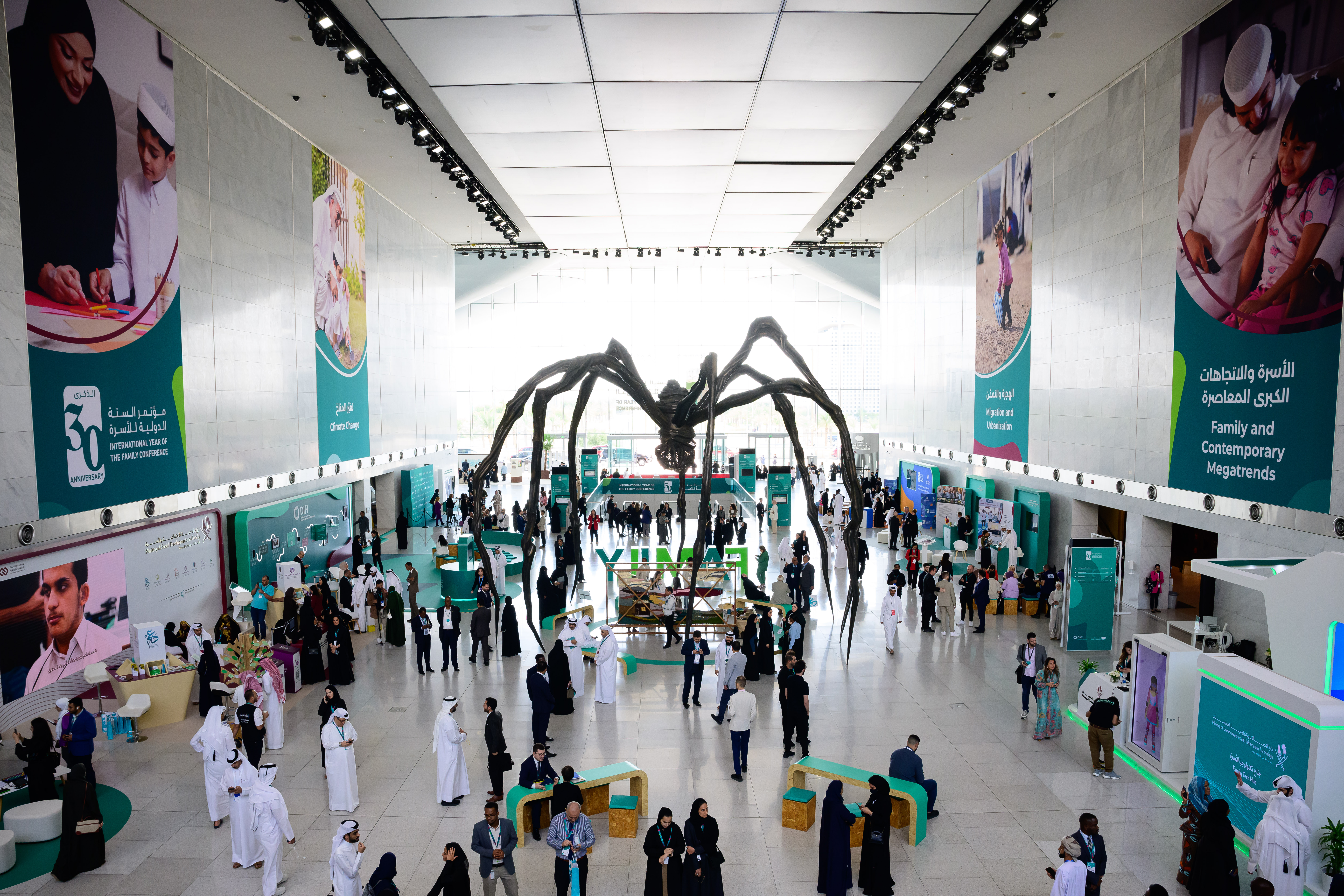
International Year of the Family Conference makes 30 recommendations
The 30th Anniversary Conference of the International Year of the Family concluded with the announcement of the "Doha Call to Action" which included a series of recommendations aimed at addressing major challenges facing families around the world.
The conference was organised by the Doha International Family Institute (DIFI), a member of Qatar Foundation, under the theme "The Family and Contemporary Mega Trends".
The “Doha Call to Action,” which was announced at the closing session, attended by Vice Chairperson and CEO of Qatar Foundation H E Sheikha Hind bint Hamad Al Thani included more than 30 recommendations.
The recommendations include prioritize families in crisis, give family needs and humanitarian support the utmost importance during times of war and conflict, integrate family education into school curricula, and establish family policies as a fundamental pillar of social justice.
The declaration also included recommendations related to enhancing research and evidence-based approaches to guide family policies, including: giving priority to the well-being of children by developing policies that prioritize their interests, involving families and youth in political decision-making and designing and implementing programs, in addition to establishing family institutions concerned with the family, and enhancing their work to develop and implement family policies.
The Doha Call for Action, a collective effort prepared by the Drafting Committee and drawing its recommendations from the preparatory documents of the conference and from the discussions it witnessed over two days, also developed recommendations related to the impact of technological changes, migration and urbanization, demographic changes, and the impact of climate change.
This call will be shared with all stakeholders in decision-making positions, UN organizations, civil society organizations, think tanks, universities, and stakeholders.
In this regard, Executive Director of the Doha International Family Institute Dr. Sharifa Noaman Al-Emadi said: “The conclusion of the conference is not resounding words or slogans to highlight the achievement, but rather a call to action in which we all participate as we participated in this conference, and each of us bears their responsibility in striving to implement the Doha Call to Action, and we join together for this purpose, from decision-making positions, international organizations, civil society organizations, think tanks, universities and the private sector.”
On the second day of the conference, a session was held entitled “Longing for Belonging: What Awaits Immigrant Families?”, in which First Lady of the Republic of Iraq H E Shanaz Ibrahim Ahmed participated.
“When families leave for new countries, they think that a better life awaits them, but in reality they face harsh conditions that deepen their sense of alienation, and they remain nostalgic to their homes no matter how long they stayed abroad,” she said.
“When people leave their homes, they have no doubt that they will soon return,” Ahmed added, adding that no refugee enters a camp thinking that their stay will be long. But years go by and people are still stuck in the camps, so better living conditions must be created for these refugees.
She said that many countries are keen to close borders and restrict immigration while selectively allowing skilled professionals to enter, and this policy leads to brain drain from countries that need them most.
Ahmed stressed the importance of addressing the causes of migration, as a gateway to reducing its impact, and improving the conditions of countries and individuals.
She pointed out that there is no global policy that places families at the top of its priorities, which calls for providing such policies that enhance the migrant or refugee's belonging to the new country by providing psychological and emotional support through specialized centers and comprehensive initiatives.
Speaking at a high-level session on ‘Family Policies in the Arab World: Comparison with Best Practices in the World’, Iran's Vice President for Women and Family Affairs H E Zahra Behrouz-Azar said that the family, despite its different cultures and diversity, constitutes the nucleus of society and the backbone of development and progress, and it remains a safe haven in the face of life’s challenges.
She touched on the role of the family, which today faces profound global challenges represented by the transformations brought about by technology in the structure of society, migration, demographic and economic changes.
Behrouz-Azar pointed out that these challenges have devastating effects on the family structure, which requires developing appropriate plans to reduce their negative effects, through adopting economic, social and cultural support policies, and improving laws and regulations related to improving the reality of these families.
She stressed that strengthening the foundations on which the family is based primarily passes through respecting the values of society, the ability to adapt and be flexible, and strengthening the bonds of solidarity among family members.
Behrouz-Azar said that protecting the family against crises requires developing programmes and initiatives for awareness, education and support.
She explained that these programmes cannot be a single, global version, but must be established according to a local design with the participation of all concerned parties and in a manner that takes into account the specificity of each community individually.
Behrouz-Azar stressed the need to value the authentic values inherited from generation to generation, while being keen to invest in these values and beliefs and reformulate them in a way that is acceptable to the new generations.
In a session entitled ‘Family First’ held on the second day of the conference, Dr. Sharifa Noman Al Emadi stressed the importance of supporting the family and policies that address it as an integrated unit, so that none of its members are excluded.
The Executive Director of the Doha International Family Institute said: “The family is seen in the strategies implemented by a number of countries around the world as the basic unit of society. However, when it comes to policies and their implementation, the focus is on women, children and the elderly, each separately, which may support a particular member of the family, but at the same time may negatively affect another member of the same family.”
“For this reason, we call for treating the family as an integrated unit, and we have evidence based on studies that show that empowering the family as a unit achieves greater benefits for society and for the family members themselves,” she added.
In a session titled ‘The Effects of Technology on Childhood: What is Apparent and What is Hidden’, the impact of technology on family life was deeply reviewed, including its impact on children’s development.
The speakers also touched on the risks and benefits related to digital transformation, such as digital addiction, cyberbullying, and digital safety.
During this session, Dr. Sika Iqbal, Assistant Professor of Psychology, University of Bradford, highlighted the importance of looking at the impact of social media holistically, including both positive and negative aspects.
She explained that providing communication among children is one of the most important effects of social media, because it helps them enhance their self-expression skills and helps them form their identity.
Iqbal noted that many children feel lonely and isolated, so social media is a great way to communicate with others.
However, she said, social media brings negative effects as well, which causes a lot of psychological pressure.
In the second day of the 30th Anniversary Conference of the International Year of the Family, a session titled ‘Technology for All: Empowerment without Restrictions’ - in partnership with the Ministry of Sports and Youth was held.
Associate Professor and Director of Interdisciplinary Programs at the College of Science and Engineering at Hamad Bin Khalifa University Dr. Dena Ahmed Saif Al Thani, spoke about research findings that showed the importance of taking cultural differences into account when designing technology for the care of the elderly.
She explained that family dynamics are very important, and access to technology for the elderly depends largely on the caregiver, and care is often provided by a family member in Arab and South Asian cultures, especially the eldest daughter in the family, and if this individual is not familiar with technology, the impact extends to the elderly in the family.
The closing session focused on the topic of family-friendly cities, with Tim Gill, a researcher, writer, independent consultant based in the city and author of a book on child-friendly urban play spaces, who recalled a time when people had to walk long distances to get to school, work or a children’s play area.
“Our cities today are not designed to be child-friendly at all,” said Tim Gill. “We’ve designed them primarily to cater to the needs of vehicles. If we really want to build child-friendly cities, we need to think about neighborhoods that provide a framework that focuses on two aspects: the first is to increase the choice and variety of places that children can go to, not just one playground, but multiple, diverse spaces. The second aspect is to think about how children can get around the neighborhoods they live in, on foot or by bicycle.”
The 30th Anniversary Conference of the International Year of the Family is organised in cooperation with the Ministry of Social Development and Family as a strategic partner, the Permanent Committee for Organizing Conferences at the Ministry of Foreign Affairs as an executive partner, and with the support of the United Nations Department of Economic and Social Affairs, and the QatarDebate Center, as a youth partner of the conference.
More News
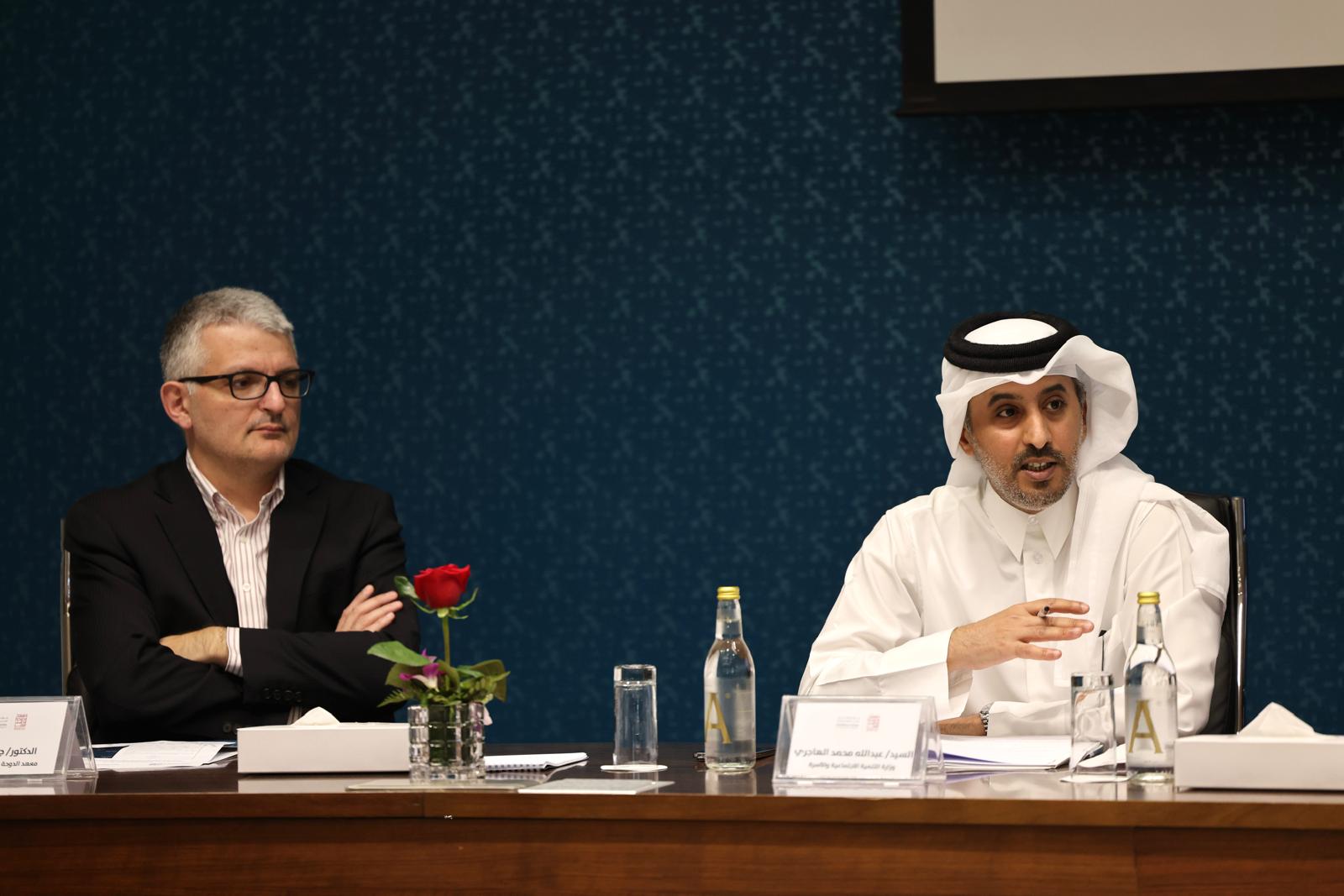
The Ministry of Social Development and Family—represented by the Private Associations and Institutions Department—in collaboration with the Excellence Center for Training and Consulting at the Doha Institute for Graduate Studies, organized a specialized panel discussion titled "Private Associations and Institutions in Qatar: Reality and Aspirations in Light of Qatar National Vision 2030."
Read more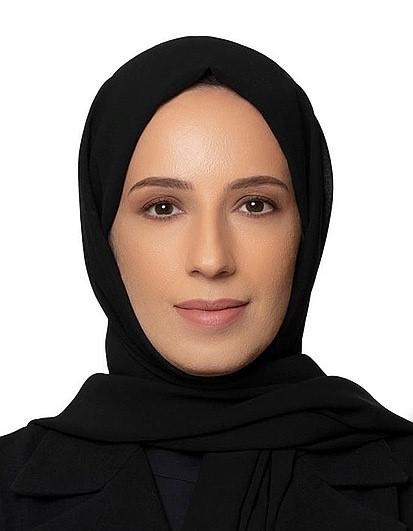
HE Minister of Social Development and Family, Buthaina bint Ali Al Jabr Al Nuaimi, participated in the 45th session of the Arab women committee, chaired by the State of Qatar, held on Feb. 10–11, 2026, which was held virtually, with the participation of Their Excellencies ministers from Arab countries, as well as representatives of the General Secretariat of the League of Arab States and relevant organizations.
Read more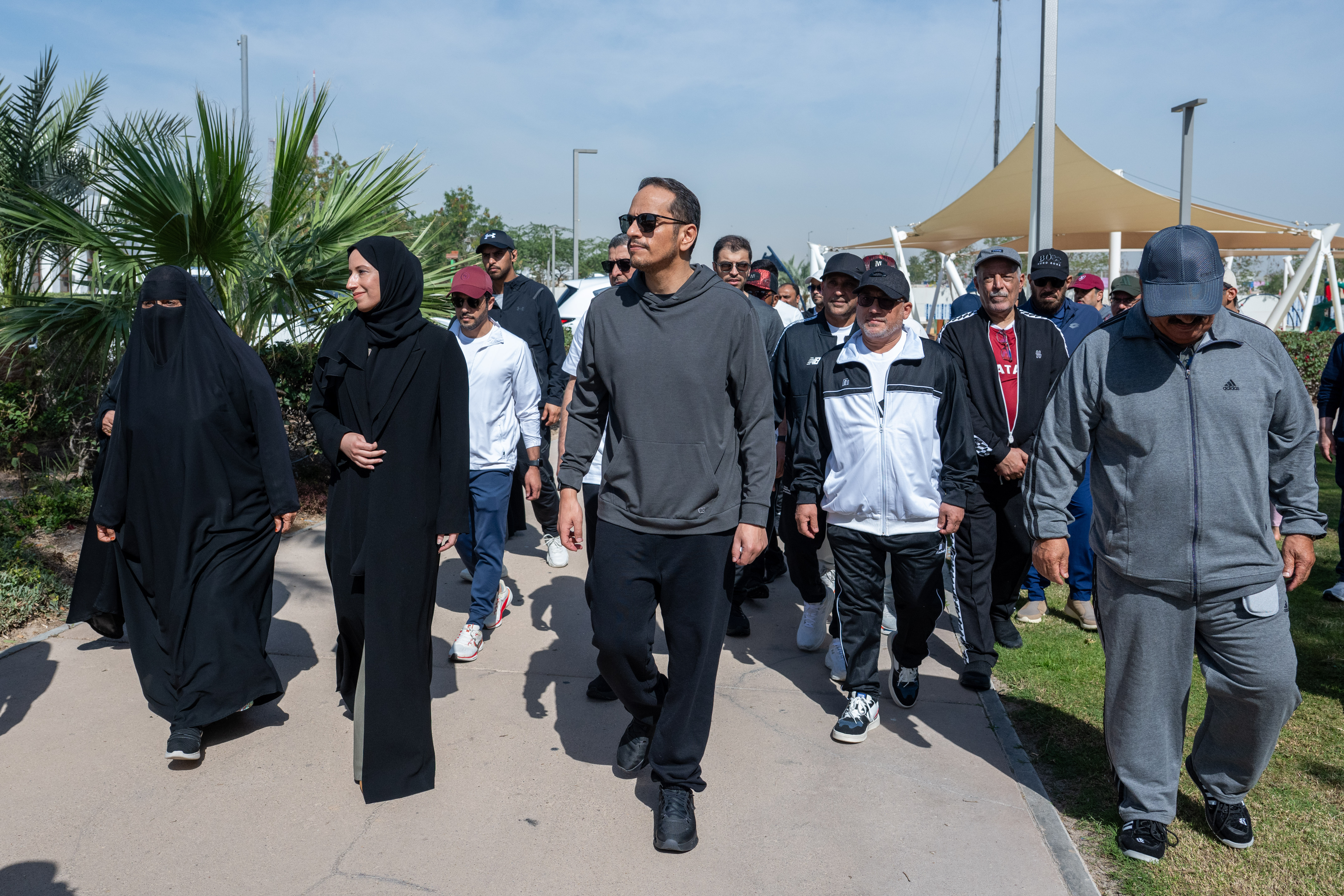
His Excellency Sheikh Mohammed bin Abdulrahman bin Jassim Al Thani, Prime Minister and Minister of Foreign Affairs, attended the 2026 National Sport Day activities organized by the Ministry of Social Development and Family (MSDF), the Qatar Foundation for Social Work (QFSW), and its affiliated centers at Al Bidda Park.
Read more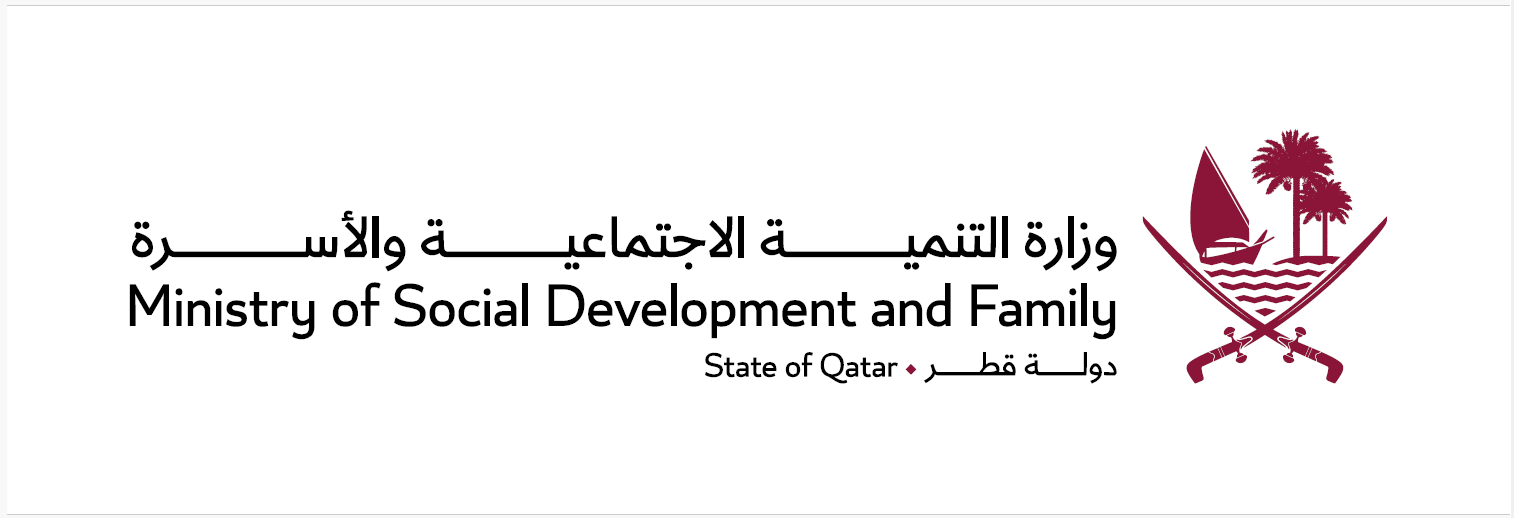
The Ministry of Social Development and Family, represented by the Family Protection Section of the Social Protection Department, is set to launch the "Gharsa Program" in collaboration with the Department of Da'wah and Religious Guidance at the Ministry of Endowments and Islamic Affairs. The inaugural event will take place on Sunday, February 8, 2026, at the Women’s Activity Building of the Department of Da'wah, from 4:00 PM to 6:00 PM.
Read more